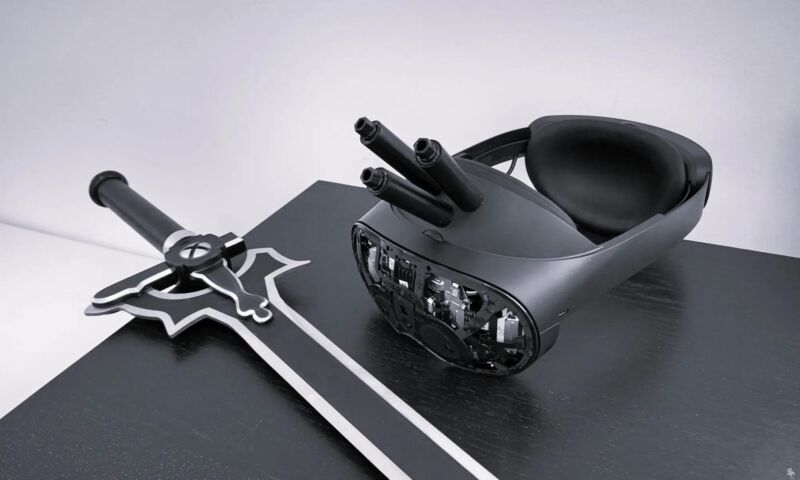Oculus Creators Makes VR Headset That Kills You in Real-Life When You Die In-Game
In the last few decades, the notion that dying in a video game or simulation might cause your death in real life has been a common trope in fictional works. Now, however, Oculus co-founder Palmer Luckey has made the concept a reality.

Luckey says he has created a VR headset that uses three strategically positioned explosives to blow the user’s brains out. A red screen flashing at a precise frequency will detonate the bombs, which are planted above the user’s forehead, Luckey says. The brain-blasting explosion can be triggered at the ‘Game Over’ screen with ease, he says.
Luckey says that his deadly headset—which appears in pictures like a modified Meta Quest Pro—is “just a piece of office art at this point, a thought-provoking reminder of unexplored avenues in game design.” He still thinks, however, that “the notion of tying your real life to your virtual persona has always fascinated me—you instantly raise the stakes to their maximum level and compel people to completely reevaluate how they interact with the virtual world and its inhabitants.”
A fictional MMORPG called Sword Art Online is at the heart of Luckey’s fascination. Thousands of people in the story are imprisoned in virtual reality on November 6, 2022, because they are wearing NerveGear headsets and are threatened with death if they die in the game or try to remove them (Wagner, 2012, p. 1).
A record of results and consequences
The first Oculus Rift Development Kit was launched on Kickstarter in 2012, when Sword Art Online was first airing, contributing to ‘Japan’s otaku enthusiasm for Oculus, which quickly became our second largest market.’ In addition to asking ‘When will you make the NerveGear [virtual reality headset] real?!’ over the years, ‘literally thousands’ of Sword Art Online fans have asked him questions.
Luckey believes that ‘only the threat of serious consequences can make a game feel real to you.’ As a result, games with serious consequences are comparable to ‘real-world sports revolving around similar stakes,’ but it’s important to remember that most sports injuries are relatively minor.
Luckey claims that this is “an area of video game mechanics that has never been explored,” but that’s not entirely accurate. In 2001, the PainStation art installation threatened players who lost a game of Pong with ‘heat, punches and electroshocks of varying duration,’ as Wired put it. That year, the ‘Tekken Torture Tournament’ was a fighting game competition in which ’32 participants received nonlethal but bracing electrical shocks in response to the injuries suffered by their onscreen avatars.’
Using “established principles of behavioral therapy to address the physiological symptoms of pain and help reduce pain through a skills-based treatment program,” an FDA-approved virtual reality pain management system was used last year to treat patient’s pain.
In spite of the fact that his deadly new headset may kill the user at the wrong time, Luckey says he hasn’t worked up the courage to use it because of a variety of failures that could occur. Luckey still has a deep interest in virtual reality, nearly five years after he was booted out of Oculus’ parent company Facebook while embroiled in controversy over political donations. Since Luckey was fired, his professional life has been focused on the military tech startup, Anduril.
In an April personal post, Luckey wrote that the tenth anniversary of Oculus’ founding was ‘the correct time to finally unveil some VR technology I haven’t been able to discuss for a range of reasons.’



